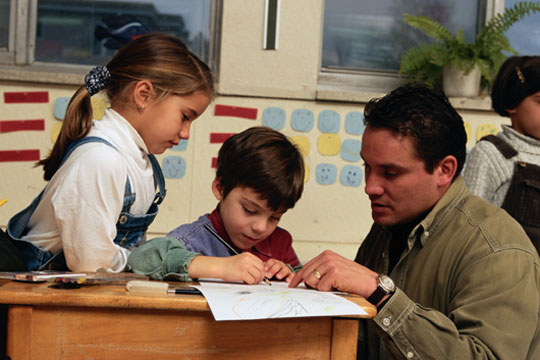
The Six Tasks of Catechesis begin with the task of promoting knowledge of the faith, or in terms of the remembering phrase HELP ME, holding on to the faith.
When a relationship between two people deepens, they want to get to know each other. They spend hours talking, meeting friends and family. This getting to know each other lasts a lifetime. Our faith life is no different. Listen to our bishops:
Such an encounter engenders in the hearers a desire to know about Christ, his life, and the content of his message. Catechesis responds to this desire by giving the believers a knowledge of the content of God’s self-revelation, which is found in Sacred Scripture and Sacred Tradition, and by introducing them to the meaning of the Creed (NDC 20).
Isn’t this what happens to us when we fall in love? As we come to know the other person’s life story we discover the mystery of that person. This is the task of passing on the knowledge of faith. We come to hold Scripture and Tradition close to our hearts because “each of them makes present and fruitful in the Church the mystery of Christ” (CCC 80). We learn the parable of the Prodigal Son as we prepare for First Reconciliation, and it teaches us about God’s forgiveness. As we experience that forgiveness over the years we grow to appreciate this gift even more. At some point we are challenged to let go of some resentment toward another’s injury to us and we realize we, like the older son, are now challenged to let go and forgive. At another time we experience the pain of seeing someone for whom we care deeply go down a path we know leads to harm, and we seek God’s wisdom and understanding to keep open the door to welcome that person home. We begin to know the depths of the Father’s forgiveness. With each experience our knowledge of the parable deepens.
In order to promote knowledge of our faith we need to practice what we preach. How am I growing in my faith? What was the last spiritual book I read? Am I taking time to deepen my knowledge of Scripture and the Catechism of the Catholic Church? Am I attending diocesan formation days and retreats?
I can hear the answers already. When can I find time to do any of this? My plate is full with family, program, and job. If growing in our faith isn’t important to us, then why should we expect it to be for others? Why should children just beginning their faith journey see the importance of taking time out of their lives for faith formation if those who lead them don’t?
How Do We Promote Knowledge of the Faith in the Classroom?
Let’s start with the basic preparation resources—the director’s guide and catechist manual. A good director’s guide gives sample presentations for catechist in-services, parent orientations, and more. Take time to become familiar with it.
The catechist manual provides a short adult formation opportunity on the topic of the lesson each week. Encourage catechists to see that this preparation may be the most practical and successful tool they have. The manual cites the references to the Catechism and to Scripture so a catechist can read more on the topic. Focusing on the adult faith resources in the manual is a key element of an in-service for new catechists’ development, effectiveness, and growth.
Now let’s look at the class itself. Approximately 50% of the lesson time is focused on promoting knowledge of the faith. The outcomes in the lesson outline stress the key points. Faith words are listed, Scripture passages highlighted, and the good manual gives clear directions on how to present the important message.
I’m always shocked at how much money is spent for those 30-second commercials shown during the Super Bowl and advertising in general. We have a much more important mission: passing on our faith, and promoting knowledge of the faith is a central piece of that mission. A member of my parish frequently reminds us that the advertising gurus’ mantra is “you have to tell people the same thing six times, six different ways, if you want to reach most of them!” Here are six tips for using that mantra to promote knowledge of the faith.
-
Emphasize the key words and Scripture. Write the words on the board, flipcharts, or poster board, and display them during class. Point them out in the lesson, and go back at the end of the class and review the words. Make flashcards with the words and definitions to practice and use in review games. Have students find the Scripture passages in the Bible rather than just reading from the book.
-
Repeat the key words or messages within the lesson.
-
Engage children in the lesson. Use the various learning styles. Small groups reviewing the words with flashcards, group activities, blackline masters, hands-on and visual reinforcement, and memory aids all make a difference.
-
Repeat messages in the weeks that follow with a short review or game.
-
Enjoy games that can appeal to all ages in learning and memorizing things. Use the flashcards to create review games. Some games you might play include baseball or Jeopardy-like and other quiz show options.
-
Repeat the message. Have I said this before? It really is that important. If it is a key concept, find ways to review it throughout the year.
—
Bill Smith has served as a catechetical leader for 40 years in a variety of parish settings, mostly within the Archdiocese of San Antonio. Bill received his Masters in Religious Studies from the University of the Incarnate Word. He has served on a variety of archdiocesan catechetical committees and is an instructor for the archdiocesan catechist formation program.




Be the first to comment